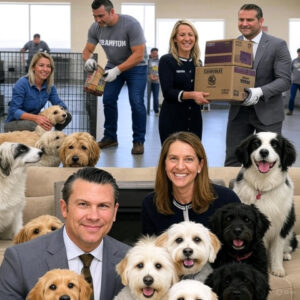The Midnight Arrival That Changed Everything
Under the veil of a moonless September night in rural Virginia, the gravel crunched beneath the tires of a nondescript SUV as it pulled up to the weathered gates of Willow Creek Animal Sanctuary. It was just past 1 a.m. on September 25, 2025, when Fox News host Pete Hegseth and his fiancée, executive producer Jennifer Rauchet, stepped out, their arms laden with bags bulging from a 200-pound haul of kibble, canned goods, and medical supplies. No cameras, no fanfare—just the quiet determination of two people who had heard whispers of a facility on the brink. As the shelter’s lone overnight volunteer, a weary-eyed Maria Gonzalez, flipped on the floodlights, tears welled in her eyes. “We thought we were done,” she later recalled. In that unassuming moment, what began as a desperate plea on a local Facebook group evolved into an act of salvation, proving that true power often whispers rather than shouts.

A Sanctuary on the Verge of Collapse
Willow Creek, nestled amid the rolling hills of Loudoun County, has long been a beacon for the voiceless—home to over 150 rescue dogs, cats, and even a handful of farm animals displaced by urban sprawl and economic hardship. Founded in 1998 by a retired veterinarian, the nonprofit has weathered floods, funding droughts, and the relentless churn of surrenders. But by mid-2025, the shelter faced its darkest hour. Donations had plummeted amid inflation’s bite, volunteer numbers dwindled, and a burst water pipe in July left kennels flooded and morale shattered. Empty food bowls lined the concrete walls like silent accusations, and euthanasia loomed as an unthinkable last resort. “We were rationing meals to half-portions,” said sanctuary director Tom Reilly. “Every day felt like borrowing time from the animals’ futures.” It was this raw vulnerability, shared in a viral post that garnered 12,000 views, that caught the eye of Rauchet during a late-night scroll.
The Unlikely Heroes: Hegseth and Rauchet’s Public Facades
Pete Hegseth, the battle-hardened Fox News co-host and author of The War on Warriors, is no stranger to the spotlight. A former Army National Guard officer with tours in Iraq and Afghanistan, he’s built a career decrying “woke” cultural shifts while championing unyielding patriotism. Jennifer Rauchet, his partner since 2019 and mother to four of his seven children, brings a behind-the-scenes steel to the equation. As a senior producer at Fox News, she’s orchestrated high-stakes broadcasts with precision, her calm demeanor a counterpoint to Hegseth’s fiery on-air persona. Yet, beneath the partisan headlines, both share a deep-rooted affinity for animals—Hegseth’s family boasts three rescue dogs, and Rauchet has volunteered at urban shelters during her New York days. “Public life can harden you,” Hegseth admitted in a rare personal reflection. “But animals? They remind us of innocence we fight to protect.” Their decision to act wasn’t broadcast; it was personal, a deliberate sidestep from the media glare.
Sparks of Inspiration: What Drove the Donation?
The catalyst was serendipitous. Rauchet stumbled upon Willow Creek’s plea while researching a segment on rural America’s hidden struggles—a topic Hegseth had pitched for Fox & Friends Weekend. What started as a casual discussion over dinner escalated into action. “We couldn’t just talk about it,” Rauchet said. “These weren’t statistics; they were lives.” By dawn the next day, they’d rallied a discreet network: a pet food distributor for the 200-pound bounty of premium kibble and wet food, a vet clinic for donated flea treatments and vaccines, and their own checkbook—unsigned and unlimited—to cover six months of operational costs. Estimated at $50,000, the blank check wasn’t a publicity stunt but a bridge to sustainability, allowing time for grant applications and community fundraisers. Hegseth, ever the strategist, framed it as “quiet power”: impact without the echo chamber of social media likes.

Instant Relief and a New Dawn
Dawn broke over Willow Creek with a frenzy of tails wagging and bowls clattering. The supplies arrived not a moment too soon—veterinarians on site reported the dogs’ energy levels rebounding within hours, with one senior Labrador, dubbed “Lucky” by staff, devouring his first full meal in weeks. The blank check enabled immediate hires: a part-time vet tech and a maintenance worker to repair the plumbing. “It’s like they waved a wand,” Reilly marveled, as volunteers restocked shelves that had echoed with emptiness. Beyond the tangible, the gesture infused the team with renewed purpose. Gonzalez, the night-shift guardian, organized a “thank you” mural in the lobby, featuring paw prints and heartfelt notes. For the animals, it meant no more skipped meals or shortened playtime; for the humans, it was a reminder that one bold move could cascade into countless small victories.
Echoes in the Community: A Ripple Effect
Word of the donation spread organically, first through local whispers and then a modest shelter newsletter that exploded on Nextdoor and community Facebook groups. Residents in Loudoun County, a mix of affluent commuters and working-class families, rallied with matching donations totaling $15,000 in the first week. “If a TV guy and his producer can show up at midnight, what’s our excuse?” quipped one contributor, a horse trainer who pledged hay bales. The story transcended politics—Hegseth’s conservative bent drew skeptics, but Rauchet’s emphasis on family and empathy bridged divides. Animal welfare advocates, from the ASPCA to grassroots orgs, hailed it as a model for “stealth philanthropy,” urging high-profile figures to follow suit. Even critics of Hegseth’s on-air rhetoric paused, with one op-ed noting, “This is the Hegseth we need more of—action over anecdote.”
Beyond the Check: Lessons in Lasting Change
This power move underscores a broader truth: true altruism thrives in the shadows. While celebrity check-writers often chase viral moments, Hegseth and Rauchet’s approach—anonymous until the shelter chose to share—avoids the pitfalls of performative giving. Experts like Dr. Elena Vasquez, a nonprofit consultant, point to studies showing that unrestricted funds like the blank check yield 30% more efficiency than earmarked donations, freeing resources for emergencies. For Willow Creek, it means expanding adoption events and partnering with schools for educational programs. Yet, challenges persist: national shelter overcrowding hit record highs in 2025, with 6.5 million animals entering facilities annually. This act, while heroic, spotlights the systemic need for policy shifts—spay/neuter incentives, affordable vet care—that Hegseth has quietly lobbied for in congressional circles.
A Legacy of Compassion Unfolding
As October’s chill settles over Virginia, Willow Creek buzzes with life: puppies tumbling in freshly mowed yards, cats lounging in sun-warmed enclosures. Hegseth and Rauchet, true to form, have already moved on to their next quiet cause, but their imprint lingers. “It’s not about us,” Rauchet reflected. “It’s about proving one night can rewrite a story.” For a sanctuary once staring down closure, the future now gleams with possibility—adoptions up 25%, volunteers doubling. In an era of division, this tale reminds us that power, wielded softly, can heal the most broken bonds. Will it inspire a movement, or remain a whispered legend? Only time—and perhaps a few more midnight arrivals—will tell.
Leave a Reply